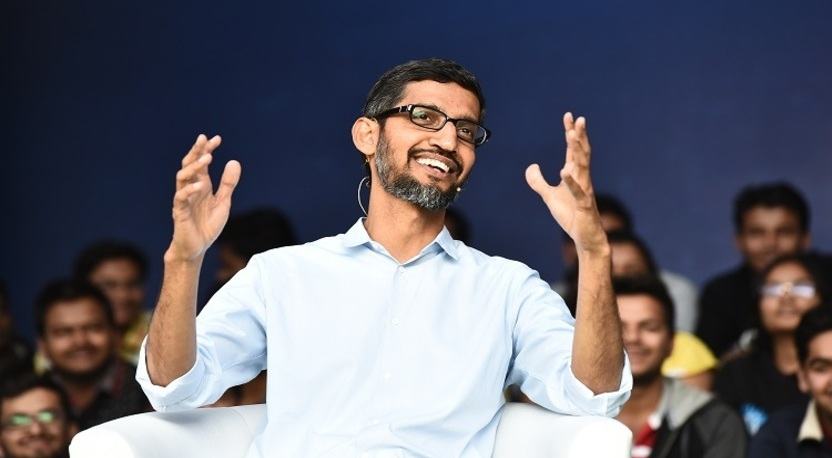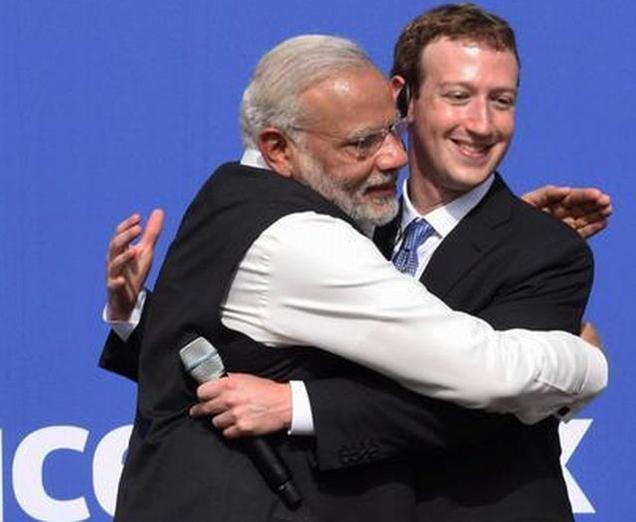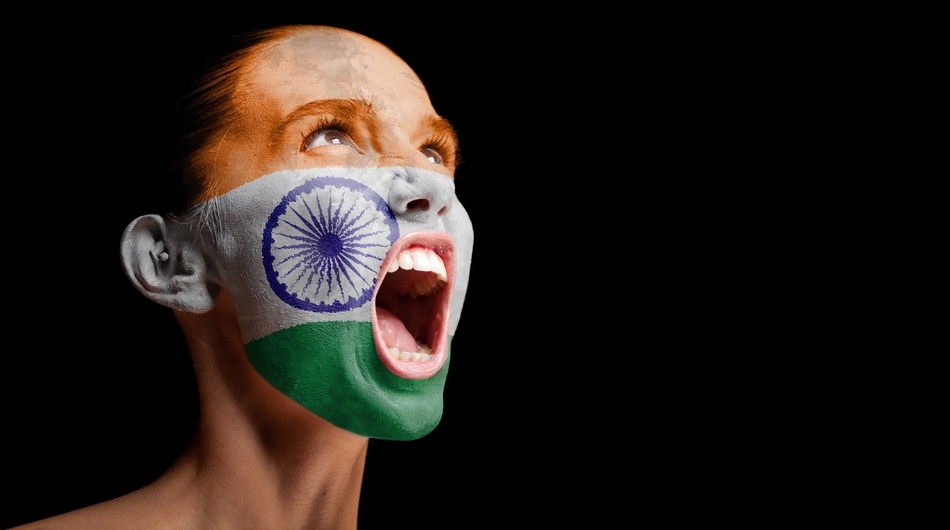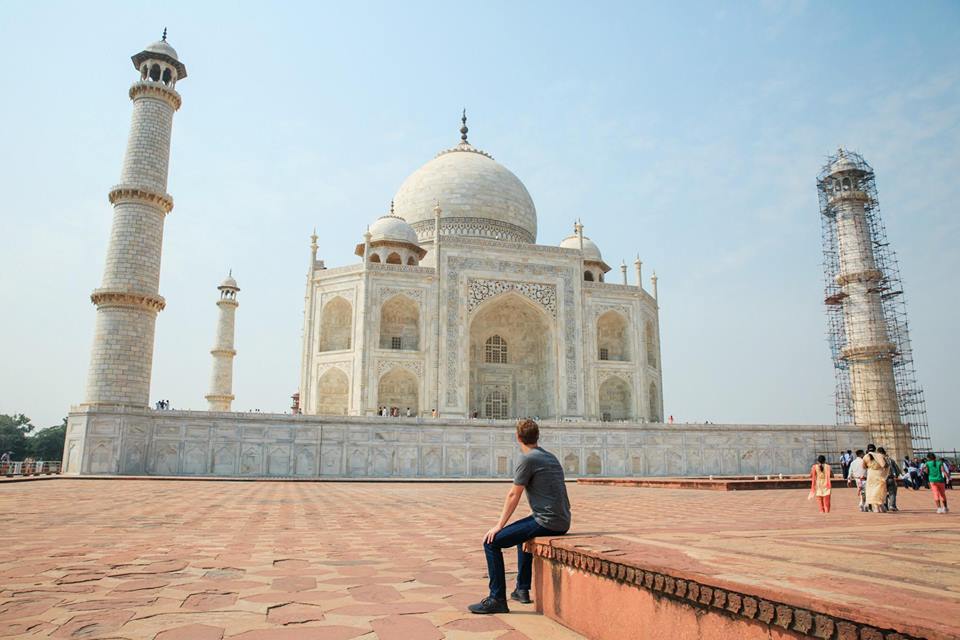
Google CEO Sundar Pichai. Photo credit : Google.
That Google loves India has been proven over and over in the past few years. If love is too strong a word, the company certainly sees the world’s fastest growing economy as a huge investment opportunity.
The latest Mary Meeker’s Internet Trends report says the number of internet users in India grew 40 percent in 2015 to 277 million. It is the only country where the growth rate of internet users in 2015 was higher than that in the previous year. India is also the second largest country in the world in terms of internet users, ahead of the US and behind China.

Indian PM Narendra Modi with Facebook CEO Mark Zuckerberg in California. Photo Credit: PTI.
Those stats make it is easy to see why every major tech company in the world, including the other giant, Facebook, is focusing on the country.
If Google has its phone launches and accelerators catered towards Indians, Facebook has its wifi and social media love. But, while Google keeps making mega announcements in the country to rave reviews, Facebook tripped up and fell flat on its face.
Google started free wifi services at about two dozen train stations in the country last year, and has 2 million people using the service each month. CEO Sundar Pichai started off 2017 with a trip to India, and a host of announcements directed at India’s small and medium sized businesses. 51 million of them, to be precise.
See: 5 ways Facebook is going all-out to win over India
The event was carefully co-ordinated to sing with the government’s “Digital India” message, as well as the current demonetisation effects sweeping the country, forcing entrepreneurs, as well as government officials to look at better digitial implementations for their businesses.
51 million businesses
On Wednesday, Pichai told media in New Delhi that Google would train 51 million small businesses to go digital. He then walked the attendees through Primer – a free mobile app designed to teach digital marketing skills. Primer lets anyone learn new marketing skills with short, bite-sized lessons. The app also works offline.
The Primer app is available on the Google Play Store and App Store in English, and Hindi with Tamil, Telugu, and Marathi versions coming shortly, the company said.

Photo credit: tpabma / 123RF.
Facebook has wooed small Indian businesses too. But, Facebook also tried to get people online via a cheap mobile plan that would let users connect to certain websites and apps for free, and the message for that was fraught with problems.
Free Basics was blocked in February by India’s telecom regulator, in a personal setback for Mark Zuckerberg, who had visited India to promote the program and was heavily invested in it.
India is the only country where the growth rate of internet users in 2015 was higher than in 2014
Facebook has since rallied, and is said to be testing an affordable wifi service in rural India], allowing users to buy data packages from local internet service providers to access the internet via local hotspots. But unlike the glitz and glamor of Google’s announcements, Facebook has not confirmed its plans yet, in what one may consider a case of once bitten, twice shy.
“We are currently in the early stages of testing Express Wi-Fi with multiple local ISP partners. As our partners prove the economic model is sustainable, we will work with them to scale the project,” a Facebook spokesperson had said in an email.
Wooing them
Google and Facebook are both in a race to get the maximum eyeballs in India, round up their next billion users, and get them to adopt their products first.
Both Facebook’s Mark Zuckerberg and Google’s Sundar Pichai keep indulging India and met Prime Minister Narendra Modi to discuss their ambitions and plans.
It's a wrap for Sundar #BackOnCampus and in keeping with the latest student trend, it ends with a selfie. pic.twitter.com/TiYebh5gwP
— Google India (@GoogleIndia) January 5, 2017
Zuckerberg has met Modi twice and also hosted him at the Facebook headquarters in Silicon Valley last year.
But while Google presents its case as a partner of the government and as an enabler, Facebook made the mistake of being condescending, even if well meaning.
Google and Facebook are both in a race to get the maximum eyeballs in India.
“Arguments about net neutrality shouldn’t be used to prevent the most disadvantaged people in society from gaining access or to deprive people of opportunity. Eliminating programs that bring more people online won’t increase social inclusion or close the digital divide. It will only deprive all of us of the ideas and contributions of the two thirds of the world who are not connected,” Zuckerberg said when Free Basics was being attacked.
Even if true, the “disadvantaged” tag did not sit well with Indians, and neither did the apprehension that this was a way for Facebook to control the budding internet industry in the country. The result was a massive upheaval and the eventual overthrow of Free Basics.
See: India’s protest against Facebook’s Internet.org goes global
“Our airwaves and wireless spectrum belong to us, the citizens of India. The government of India temporary licenses this on our behalf to telcos under some terms and conditions, and those terms have always pushed for the development of all of India, including our poor,” noted internet activist Mahesh Murthy.

“It is even more stunning than I expected. It’s incredible what people can build — and what love can motivate us to build,” says Mark Zuckerberg about the Taj Mahal.
Google, on the other hand, talked about working with the government, and changing itself for the country in the process. For Tuesday’s announcement, Google said it would team up with the Federation of Indian Chambers of Commerce and Industry to conduct 5,000 workshops covering 40 cities in India over the next three years.
“The Internet is a powerful equalizer and we are motivated to bring the benefits of information and technology to as many people as possible. Building for everyone and making it available in the hands of as many people is at the heart and core of what we do. And we do this by investing in open ecosystems,” Sundar said. (Note the use of words like “equalizer”, and “everyone”, as against Zuck’s “disadvantaged.”)
For the free wi-fi at railway stations, the company tied up with the government-run RailTel Corporation of India.
Google’s constant engagement with and inclusion of the local government has held it in good stead. The result is that in India – the biggest battle ground for connectivity for these companies – it has outpaced Facebook in getting the next bunch of first-time users online.
This is an opinion piece.
This post How Google played its cards right in India, and Facebook suffered appeared first on Tech in Asia.
from Tech in Asia https://www.techinasia.com/google-winning-over-facebook-in-india
via IFTTT
No comments:
Post a Comment